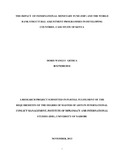| dc.contributor.author | Githua, Doris W | |
| dc.date.accessioned | 2013-11-25T15:48:21Z | |
| dc.date.available | 2013-11-25T15:48:21Z | |
| dc.date.issued | 2013 | |
| dc.identifier.uri | http://erepository.uonbi.ac.ke:8080/xmlui/handle/123456789/60212 | |
| dc.description.abstract | The main purpose of the study was to examine impact of IMF/ World Bank Structural
Adjustment Programs on developing countries with their application in Kenya. The
Globalization of the world economy especially since the Second World War has given rise to
large global inequalities which has been responsible for an increase in the number and proportion
of human population suffering from absolute poverty and starvation. Dependency theory, argues
that the IMF and the World Bank policies and programs have indeed been heavily criticized for
many years and have been seen as unhelpful and sometimes difficult to account, as they have led
to increased dependency by developing countries upon wealthier nations. Data was mainly be
derived from secondary and primary sources. The data collection tools for the secondary data
that were in-depth information gathering, and document analysis. The study concludes that
IMF/World Bank Structural Adjustment Policies increase poverty and cause underdevelopment.
The study concludes that social sectors such as health and education are most affected by these
policies as less money is put in social projects by governments’ hence the underdevelopment | en |
| dc.language.iso | en | en |
| dc.publisher | University of Nairobi, | |
| dc.title | The Impact of International Monetary Fund (Imf) and the World Bank Structural Adjustment Programmes in Developing Countries, Case Study of Kenya | en |
| dc.type | Thesis | en |
| local.publisher | The Institute Of Diplomacy And International Studies | en |

